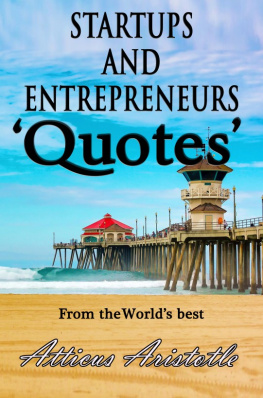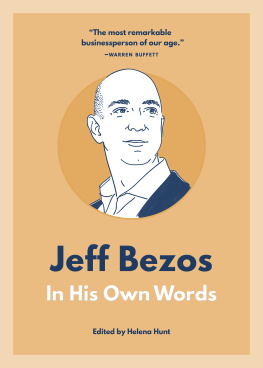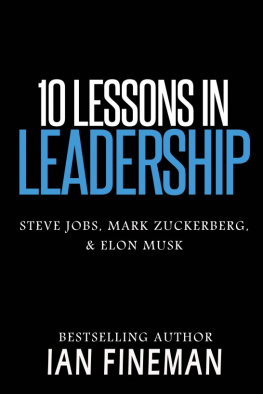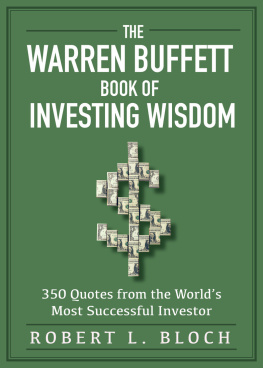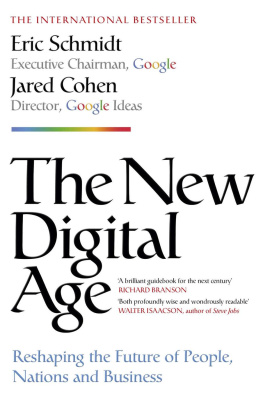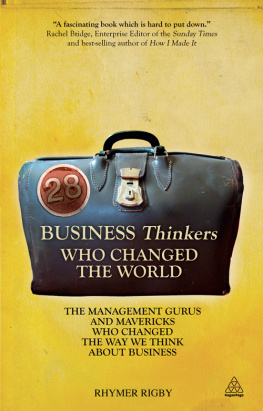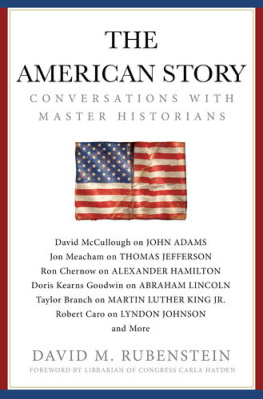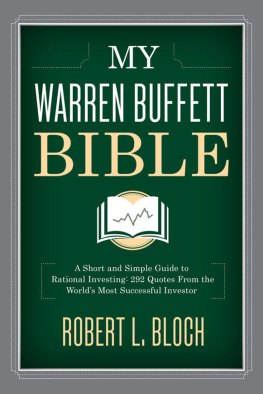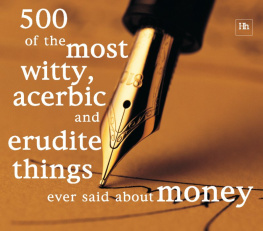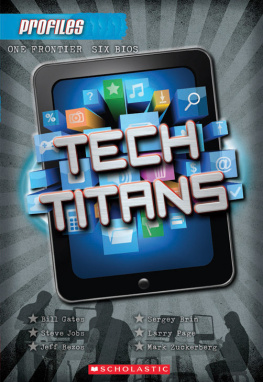Aristotle - Startups and Entrepreneurs: Quotes from the Worlds best
Here you can read online Aristotle - Startups and Entrepreneurs: Quotes from the Worlds best full text of the book (entire story) in english for free. Download pdf and epub, get meaning, cover and reviews about this ebook. year: 2014, genre: Business. Description of the work, (preface) as well as reviews are available. Best literature library LitArk.com created for fans of good reading and offers a wide selection of genres:
Romance novel
Science fiction
Adventure
Detective
Science
History
Home and family
Prose
Art
Politics
Computer
Non-fiction
Religion
Business
Children
Humor
Choose a favorite category and find really read worthwhile books. Enjoy immersion in the world of imagination, feel the emotions of the characters or learn something new for yourself, make an fascinating discovery.
Startups and Entrepreneurs: Quotes from the Worlds best: summary, description and annotation
We offer to read an annotation, description, summary or preface (depends on what the author of the book "Startups and Entrepreneurs: Quotes from the Worlds best" wrote himself). If you haven't found the necessary information about the book — write in the comments, we will try to find it.
Startups and Entrepreneurs: Quotes from the Worlds best — read online for free the complete book (whole text) full work
Below is the text of the book, divided by pages. System saving the place of the last page read, allows you to conveniently read the book "Startups and Entrepreneurs: Quotes from the Worlds best" online for free, without having to search again every time where you left off. Put a bookmark, and you can go to the page where you finished reading at any time.
Font size:
Interval:
Bookmark:
Startups andEntrepreneurs:
Quotes from the Worlds best
Atticus Aristotle
Copyright 2014 Atticus Aristotle
www.atticusaristotle.com
All rights reserved.
Smashwords Edition
Jeff Bezos was born in Albuquerque, NewMexico in 1964. Bezos is the founder of Amazon, the largestretailer in the world. He graduated from Princeton University in1986 with a Bachelor of Science in Engineering in electricalengineering and computer science.
As of 2014 his net worth was $32.3billion.
We see our customers as invited guests to aparty, and we are the hosts. It's our job every day to make everyimportant aspect of the customer experience a little bitbetter.
What we need to do is always lean into thefuture; when the world changes around you and when it changesagainst you - what used to be a tail wind is now a head wind - youhave to lean into that and figure out what to do becausecomplaining isn't a strategy.
The best customer service is if the customerdoesn't need to call you, doesn't need to talk to you. It justworks.
The common question that gets asked inbusiness is, 'why?' That's a good question, but an equally validquestion is, 'why not?'
A brand for a company is like a reputationfor a person. You earn reputation by trying to do hard thingswell.
There are two kinds of companies, those thatwork to try to charge more and those that work to charge less. Wewill be the second.
I believe you have to be willing to bemisunderstood if you're going to innovate.
Life's too short to hang out with people whoaren't resourceful.
I don't want to use my creative energy onsomebody else's user interface.
I strongly believe that missionaries makebetter products. They care more. For a missionary, it's not justabout the business. There has to be a business, and the businesshas to make sense, but that's not why you do it. You do it becauseyou have something meaningful that motivates you.
It's not an experiment if you know it's goingto work.
We've had three big ideas at Amazon thatwe've stuck with for 18 years, and they're the reason we'resuccessful: Put the customer first. Invent. And be patient.
The one thing that offends me the most iswhen I walk by a bank and see ads trying to convince people to takeout second mortgages on their home so they can go on vacation.That's approaching evil.
There are two ways to extend a business. Takeinventory of what you're good at and extend out from your skills.Or determine what your customers need and work backward, even if itrequires learning new skills. Kindle is an example of workingbackward.
If you're competitor-focused, you have towait until there is a competitor doing something. Beingcustomer-focused allows you to be more pioneering.
Real estate is the key cost of physicalretailers. That's why there's the old saw: location, location,location.
I think frugality drives innovation, justlike other constraints do. One of the only ways to get out of atight box is to invent your way out.
Amazon.com strives to be the e-commercedestination where consumers can find and discover anything theywant to buy online.
Because, you know, resilience - if you thinkof it in terms of the Gold Rush, then you'd be pretty depressedright now because the last nugget of gold would be gone. But thegood thing is, with innovation, there isn't a last nugget. Everynew thing creates two new questions and two new opportunities.
If your customer base is aging with you, theneventually you are going to become obsolete or irrelevant. You needto be constantly figuring out who are your new customers and whatare you doing to stay forever young.
What consumerism really is, at its worst isgetting people to buy things that don't actually improve theirlives.
Millions of people were inspired by theApollo Program. I was five years old when I watched Apollo 11unfold on television, and without any doubt it was a bigcontributor to my passions for science, engineering, andexploration.
I think that, ah, I'm a very goofy sort ofperson in many ways.
If you do build a great experience, customerstell each other about that. Word of mouth is very powerful.
There'll always be serendipity involved indiscovery.
My view is there's no bad time toinnovate.
I don't think that you can invent on behalfof customers unless you're willing to think long-term, because alot of invention doesn't work. If you're going to invent, it meansyou're going to experiment, and if you're going to experiment,you're going to fail, and if you're going to fail, you have tothink long term.
The thing that motivates me is a very commonform of motivation. And that is, with other folks counting on me,it's so easy to be motivated.
If you don't understand the details of yourbusiness you are going to fail.
It is very difficult to get people to focuson the most important things when you're in boom times.
Market leadership can translate directly tohigher revenue, higher profitability, greater capital velocity, andcorrespondingly stronger returns on invested capital.
What's dangerous is not to evolve.
Ebooks had to happen.
You're not going to make Hemingway better byadding animations.
Strip malls are history.
Cultures, for better or worse, are verystable.
I went to Princeton specifically to studyphysics.
I'm a big fan of all-you-can-eat plans,because they're simpler for customers.
If you only do things where you know theanswer in advance, your company goes away.
Mediocre theoretical physicists make noprogress. They spend all their time understanding other people'sprogress.
My own view is that every company requires along-term view.
One of the things it was obvious you could dowith an online store is have a much more complete selection.
The human brain is an incrediblepattern-matching machine.
The key thing about a book is that you loseyourself in the author's world.
You don't want to negotiate the price ofsimple things you buy every day.
You know, we love stories and we lovenarrative; we love to get lost in an author's world.
You want your customers to value yourservice.
We expect all our businesses to have apositive impact on our top and bottom lines. Profitability is veryimportant to us or we wouldn't be in this business.
The killer app that got the world ready forappliances was the light bulb. So the light bulb is what wired theworld. And they weren't thinking about appliances when they wiredthe world. They were really thinking about - they weren't puttingelectricity into the home. They were putting lighting into thehome.
I'm skeptical of any mission that hasadvertisers at its centerpiece.
I think the definition of a book ischanging.
Percentage margins don't matter. What mattersalways is dollar margins: the actual dollar amount. Companies arevalued not on their percentage margins, but on how many dollarsthey actually make, and a multiple of that.
The book is not really the container for thebook. The book itself is the narrative. It's the thing that peoplecreate.
For people who are readers, reading isimportant to them.
I'm skeptical that the novel will be're-invented.'
I've always been at the intersection ofcomputers and whatever they can revolutionize.
A company shouldn't get addicted to beingshiny, because shiny doesn't last.
For many people, extended reading sessions onan LCD display cause eyestrain.
I don't know about you, but most of myexchanges with cashiers are not that meaningful.
I like having the digital camera on my smartphone, but I also like having a dedicated camera for when I want totake real pictures.
I think there are going to be a bunch oftablet-like devices. It's really a different product category.
Next pageFont size:
Interval:
Bookmark:
Similar books «Startups and Entrepreneurs: Quotes from the Worlds best»
Look at similar books to Startups and Entrepreneurs: Quotes from the Worlds best. We have selected literature similar in name and meaning in the hope of providing readers with more options to find new, interesting, not yet read works.
Discussion, reviews of the book Startups and Entrepreneurs: Quotes from the Worlds best and just readers' own opinions. Leave your comments, write what you think about the work, its meaning or the main characters. Specify what exactly you liked and what you didn't like, and why you think so.

